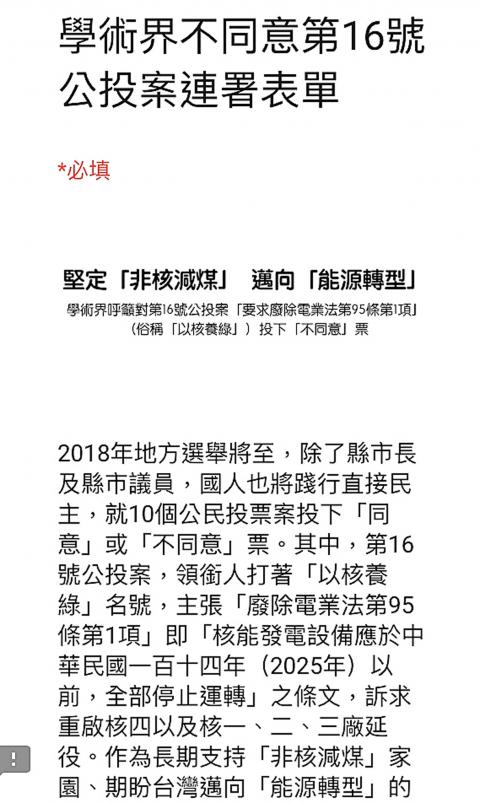Forty-eight academics yesterday launched a petition against a referendum that aims to scrap the government’s policy of achieving a “nuclear-free homeland by 2025,” collecting more than 200 signatures from colleagues on the first day.
Among the initiators were Academia Sinica academicians Lin Ming-chang (林明璋) and Lin Chang-shou (林長壽), National Chung Hsing University environmental engineering professor Tsuang Ben-jei (莊秉潔) and National Taiwan University geoscience professor Chen Wen-shan (陳文山).
The referendum, one of several to be held alongside the Nov. 24 elections, asks voters if they agree with abolishing Article 95-1 of the Electricity Act (電業法), which stipulates that all of Taiwan’s nuclear power generation facilities should be decommissioned by 2025.

Photo: Lin Hsiao-yun, Taipei Times
The petition’s organizers citied the risk of a nuclear plant disaster and environmental problems associated with the disposal of nuclear waste in urging people to vote against the referendum.
Regarding the referendum advocates’ call for resuming the construction of the Fourth Nuclear Power Plant in New Taipei City’s Gongliao District (貢寮), the petition organizers wrote that the proposal was not feasible, as the plant’s construction involved more than 500 infringements by Taiwan Power Co (台電) and cost nearly NT$300 billion (US$9.76 billion at the current exchange rate) before it was mothballed in 2015.
Nuclear plants in Taiwan face higher levels of risk and are costlier to operate than those in other nations, as Taiwan sits on active fault lines and is more likely to experience flooding and tsunamis, they wrote.
The referendum advocates proposed that 20 percent of the nation’s electricity be generated from nuclear power, 40 percent from coal, 30 percent from gas and 10 percent from renewable sources, which the petition organizaers said would not help curtail air pollution as the advocates have claimed.
The petition organizers also said it would be dangerous to have 20 percent of power generated from decades-old nuclear plants and the poorly built Fourth Nuclear Power Plant.
Nuclear energy would leave behind nuclear waste for future generations to take care of, the petition organizers said.
The petition calls on policymakers to devote the nation’s limited resources to developing renewable energy sources, instead of nuclear and coal-fired facilities.

CHAOS: Iranians took to the streets playing celebratory music after reports of Khamenei’s death on Saturday, while mourners also gathered in Tehran yesterday Iranian Supreme Leader Ayatollah Ali Khamenei was killed in a major attack on Iran launched by Israel and the US, throwing the future of the Islamic republic into doubt and raising the risk of regional instability. Iranian state television and the state-run IRNA news agency announced the 86-year-old’s death early yesterday. US President Donald Trump said it gave Iranians their “greatest chance” to “take back” their country. The announcements came after a joint US and Israeli aerial bombardment that targeted Iranian military and governmental sites. Trump said the “heavy and pinpoint bombing” would continue through the week or as long

TRUST: The KMT said it respected the US’ timing and considerations, and hoped it would continue to honor its commitments to helping Taiwan bolster its defenses and deterrence US President Donald Trump is delaying a multibillion-dollar arms sale to Taiwan to ensure his visit to Beijing is successful, a New York Times report said. The weapons sales package has stalled in the US Department of State, the report said, citing US officials it did not identify. The White House has told agencies not to push forward ahead of Trump’s meeting with Chinese President Xi Jinping (習近平), it said. The two last month held a phone call to discuss trade and geopolitical flashpoints ahead of the summit. Xi raised the Taiwan issue and urged the US to handle arms sales to

BIG SPENDERS: Foreign investors bought the most Taiwan equities since 2005, signaling confidence that an AI boom would continue to benefit chipmakers Taiwan Semiconductor Manufacturing Co’s (TSMC, 台積電) market capitalization swelled to US$2 trillion for the first time following a 4.25 percent rally in its American depositary receipts (ADR) overnight, putting the world’s biggest contract chipmaker sixth on the list of the world’s biggest companies by market capitalization, just behind Amazon.com Inc. The site CompaniesMarketcap.com ranked TSMC ahead of Saudi Aramco and Meta Platforms Inc. The Taiwanese company’s ADRs on Tuesday surged to US$385.75 on the New York Stock Exchange, as strong demand for artificial intelligence (AI) applications led to chip supply constraints and boost revenue growth to record-breaking levels. Each TSMC ADR represents

State-run CPC Corp, Taiwan (CPC, 台灣中油) yesterday said that it had confirmed on Saturday night with its liquefied natural gas (LNG) and crude oil suppliers that shipments are proceeding as scheduled and that domestic supplies remain unaffected. The CPC yesterday announced the gasoline and diesel prices will rise by NT$0.2 and NT$0.4 per liter, respectively, starting Monday, citing Middle East tensions and blizzards in the eastern United States. CPC also iterated it has been reducing the proportion of crude oil imports from the Middle East and diversifying its supply sources in the past few years in response to geopolitical risks, expanding